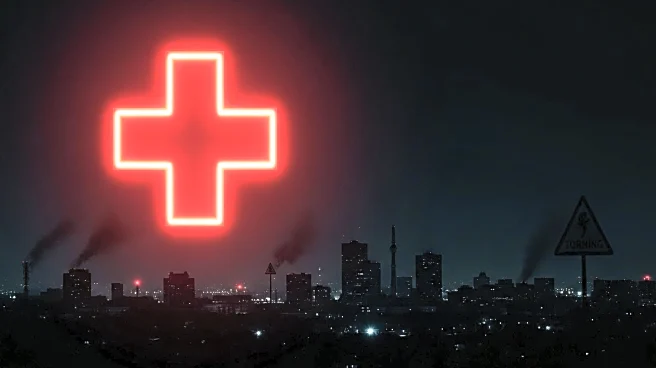What's Happening?
The Red Cross has declared that a mass evacuation of Gaza City is impossible due to the dire conditions in the region. The Israeli military plans to halt airdrops and reduce relief truck entries as it prepares for a major offensive in Gaza City. The Red Cross President, Mirjana Spoljaric, emphasized that the conditions required by international humanitarian law cannot be met, making a safe and dignified evacuation unfeasible. The situation in Gaza City is critical, with over one million people displaced and severe shortages of food, water, shelter, and medical care. The Israeli military has intensified bombing and ground attacks, leading to significant casualties and further straining vital services.
Why It's Important?
The inability to evacuate Gaza City safely highlights the humanitarian crisis in the region. The ongoing conflict and military actions have severe implications for the civilian population, exacerbating shortages and increasing casualties. The Red Cross's statement underscores the challenges faced by international organizations in providing aid and protecting civilians. The situation could lead to increased international scrutiny and pressure on Israel to reconsider its military strategy. The humanitarian impact is profound, affecting not only the immediate safety and well-being of Gaza's residents but also the broader geopolitical dynamics in the Middle East.
What's Next?
The Israeli military's planned offensive in Gaza City is likely to escalate tensions further. The halt in airdrops and reduction in relief efforts may worsen the humanitarian situation, prompting international calls for intervention or ceasefire negotiations. The security cabinet's refusal to discuss a ceasefire proposal accepted by Hamas could lead to increased domestic and international criticism of the Israeli government. Families of hostages and anti-war protesters in Israel are demanding a ceasefire, which could influence political decisions and public opinion. The Red Cross and other humanitarian organizations may continue to advocate for safe evacuation and increased aid access.
Beyond the Headlines
The situation in Gaza City raises ethical and legal questions about the conduct of military operations and the protection of civilians in conflict zones. The Red Cross's statement highlights the challenges of adhering to international humanitarian law in such complex environments. The ongoing conflict may lead to long-term shifts in regional alliances and international relations, as countries and organizations respond to the humanitarian crisis. The plight of Gaza's residents could become a focal point for global advocacy and diplomatic efforts, potentially influencing future peace negotiations and conflict resolution strategies.










